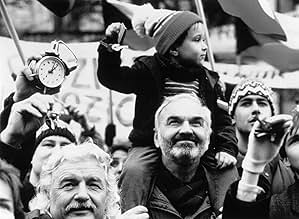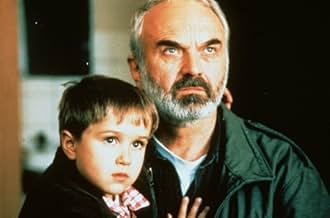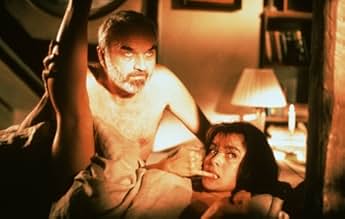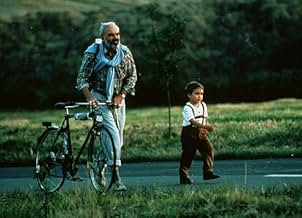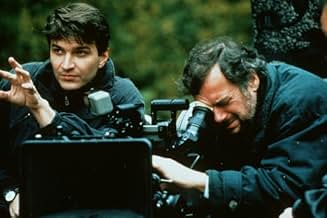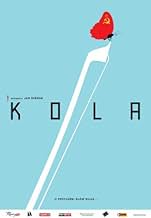IMDb-BEWERTUNG
7,7/10
16.663
IHRE BEWERTUNG
Ein eingefleischter Junggeselle erlebt die Überraschung seines Lebens, als ein Plan, um schnell reich zu werden, nach hinten losgeht und ihm eine winzige neue Mitbewohnerin beschert.Ein eingefleischter Junggeselle erlebt die Überraschung seines Lebens, als ein Plan, um schnell reich zu werden, nach hinten losgeht und ihm eine winzige neue Mitbewohnerin beschert.Ein eingefleischter Junggeselle erlebt die Überraschung seines Lebens, als ein Plan, um schnell reich zu werden, nach hinten losgeht und ihm eine winzige neue Mitbewohnerin beschert.
- Regie
- Drehbuch
- Hauptbesetzung
- 1 Oscar gewonnen
- 21 Gewinne & 14 Nominierungen insgesamt
Zdenek Sverák
- Louka
- (as Zdeněk Svěrák)
Andrey Khalimon
- Kolja
- (as Andrej Chalimon)
Irina Bezrukova
- Nadezda
- (as Irina Livanova)
Liliyan Malkina
- Tamara
- (as Lilian Malkina)
Nela Boudová
- Brozová
- (as Nella Boudová)
Empfohlene Bewertungen
Take the old formula of two mismatched people being forced to live together, and rejuvenate it by losing the cliches and adding excellent script and direction, and utterly superb acting by all the cast, especially the two leads (the grouch and the boy). The characterisations are just spot on.
Whenever I see films like this I end up both very glad to have seen such an outstanding movie, and extremely irritated that practically no-one knows about this gem of a movie, yet films like 'Godzilla' rake in money.
My thanks to all involved with this movie; you have produced a work of art.
Whenever I see films like this I end up both very glad to have seen such an outstanding movie, and extremely irritated that practically no-one knows about this gem of a movie, yet films like 'Godzilla' rake in money.
My thanks to all involved with this movie; you have produced a work of art.
It is 1988, and Czech bachelor Frantisek Louka is struggling to make ends meet. A talented cellist, his main source of employment is playing at the various crematoriums in Prague; though he'll do most work that comes his way. One day, a friend offers him the chance to earn a large amount of money through a sham marriage to a Russian lady, which would enable her- and her five-year-old son Kolya- to stay in Czechoslovakia. However, weeks after they are married, the woman uses her new citizenship to emigrate to West Germany, leaving Louka to look after a boy he barely knows.
A touching comic-drama, Jan Sverák's 'Kolya' tells a familiar tale; though tells it well. Rather like Takeshi Kitano's 'Kikujiro,' the film follows an unlikely father-figure who grows to love the ward in his charge, changing as a person as he does so. As Louka and Kolya become comfortable with one another, the narrative- written by Zdenek Sverák and based on an idea from Pavel Taussig- examines the importance of connection, detailing how one's life can be enriched by even the most unlikely of relationships.
A poignant character study, the film shows Louka's journey from a gruff, womanising cynic to someone with a greater appreciation for life- thanks to his experiences with Kolya. His time with the boy changes him for the better, and the film's bittersweet ending hints that he will never be the same. While not original on paper, the genuinely heartwarming story has a sardonic edge, while Sverák's screenplay abounds with thematic depth and irreverent, dry humour.
Additionally, the film can be seen as a reflection of the end of the Soviet occupation of Czechoslovakia, offering a nuanced critique of same, highlighting the tensions and ironies of the time. Most evidently, Louka's interactions with the Soviet bureaucratic system are emblematic of the inefficiencies and frustrations experienced by many Czechs under Soviet rule. His sham marriage to a Russian woman, and the subsequent responsibility of caring for her son, can be seen as a microcosm of the larger political dynamics at play. This relationship mirrors the complex, often strained interactions between Czechs and Russians during the occupation.
Moreover, the film poignantly portrays contextual conflicting attitudes towards Russians through its characters. For instance, Louka's initial reluctance to care for Kolya reflects a broader societal scepticism towards foreigners, particularly Russians, who were often viewed with suspicion and resentment at the time in occupied lands. Conversely, Louka's gradual transformation symbolizes a potential for reconciliation and understanding amidst political turmoil; paralleling his country's own path towards greater openness and eventual independence.
In addition, Vladimír Smutný's lush cinematography expertly captures Prague's beautiful melancholy, enhancing the narrative's depth and resonance. Smutný uses a rich colour palette and varied lighting to reflect the film's shifting moods. The muted tones and soft lighting in Louka's apartment convey a sense of isolation and mundanity, while the brighter, more vibrant scenes with Kolya highlight the boy's innocence and the joy he brings into his world. This visual contrast effectively underscores Louka's transformation throughout the film.
Smutný's cinematography also adeptly captures the essence of late 1980's Czechoslovakia, with a visual style reflecting the period's socio-political atmosphere. Many scenes subtly incorporate elements of Soviet influence and the impending change brought by the Velvet Revolution, which helps immerse one in the historical setting and reality of the narrative. Milos Kohout's art direction, as well as Katarina Hollá's costume design, only compounds this immersive realism, while Ondrej Soukup's stirring score drifts through the picture like a euphonious wind, heightening its emotional impact.
In addition to writing the screenplay, Zdenek Sverák stars as Louka, delivering a nuanced, grounded performance that is engaging and heartrending. His portrayal of Louka's transformation is subtle yet powerful, capturing the character's journey from cynic to father-figure astutely. Opposite him, Andrey Khalimon, as Kolya, lights up the screen, showing a natural acting ability, and the two work wonderfully together. Meanwhile, Libuse Safránková and Ondrej Vetchý excel in the supporting roles of Klara, one of Louka's girlfriends, and Broz, the friend whose actions get the narrative moving, respectively.
In short, though Jan Sverák's 'Kolya' tells a familiar tale, it tells it very well, and is memorable and moving both. Resonating on multiple levels, its narrative is engaging and its characters compelling. Boasting striking cinematography, as well as a fine score, it is routinely well-acted, especially by stars Zdenek Sverák and Andrey Khalimon. To put it simply, 'Kolya' is a bittersweet symphony that plucks at the heartstrings and plays all the right notes.
A touching comic-drama, Jan Sverák's 'Kolya' tells a familiar tale; though tells it well. Rather like Takeshi Kitano's 'Kikujiro,' the film follows an unlikely father-figure who grows to love the ward in his charge, changing as a person as he does so. As Louka and Kolya become comfortable with one another, the narrative- written by Zdenek Sverák and based on an idea from Pavel Taussig- examines the importance of connection, detailing how one's life can be enriched by even the most unlikely of relationships.
A poignant character study, the film shows Louka's journey from a gruff, womanising cynic to someone with a greater appreciation for life- thanks to his experiences with Kolya. His time with the boy changes him for the better, and the film's bittersweet ending hints that he will never be the same. While not original on paper, the genuinely heartwarming story has a sardonic edge, while Sverák's screenplay abounds with thematic depth and irreverent, dry humour.
Additionally, the film can be seen as a reflection of the end of the Soviet occupation of Czechoslovakia, offering a nuanced critique of same, highlighting the tensions and ironies of the time. Most evidently, Louka's interactions with the Soviet bureaucratic system are emblematic of the inefficiencies and frustrations experienced by many Czechs under Soviet rule. His sham marriage to a Russian woman, and the subsequent responsibility of caring for her son, can be seen as a microcosm of the larger political dynamics at play. This relationship mirrors the complex, often strained interactions between Czechs and Russians during the occupation.
Moreover, the film poignantly portrays contextual conflicting attitudes towards Russians through its characters. For instance, Louka's initial reluctance to care for Kolya reflects a broader societal scepticism towards foreigners, particularly Russians, who were often viewed with suspicion and resentment at the time in occupied lands. Conversely, Louka's gradual transformation symbolizes a potential for reconciliation and understanding amidst political turmoil; paralleling his country's own path towards greater openness and eventual independence.
In addition, Vladimír Smutný's lush cinematography expertly captures Prague's beautiful melancholy, enhancing the narrative's depth and resonance. Smutný uses a rich colour palette and varied lighting to reflect the film's shifting moods. The muted tones and soft lighting in Louka's apartment convey a sense of isolation and mundanity, while the brighter, more vibrant scenes with Kolya highlight the boy's innocence and the joy he brings into his world. This visual contrast effectively underscores Louka's transformation throughout the film.
Smutný's cinematography also adeptly captures the essence of late 1980's Czechoslovakia, with a visual style reflecting the period's socio-political atmosphere. Many scenes subtly incorporate elements of Soviet influence and the impending change brought by the Velvet Revolution, which helps immerse one in the historical setting and reality of the narrative. Milos Kohout's art direction, as well as Katarina Hollá's costume design, only compounds this immersive realism, while Ondrej Soukup's stirring score drifts through the picture like a euphonious wind, heightening its emotional impact.
In addition to writing the screenplay, Zdenek Sverák stars as Louka, delivering a nuanced, grounded performance that is engaging and heartrending. His portrayal of Louka's transformation is subtle yet powerful, capturing the character's journey from cynic to father-figure astutely. Opposite him, Andrey Khalimon, as Kolya, lights up the screen, showing a natural acting ability, and the two work wonderfully together. Meanwhile, Libuse Safránková and Ondrej Vetchý excel in the supporting roles of Klara, one of Louka's girlfriends, and Broz, the friend whose actions get the narrative moving, respectively.
In short, though Jan Sverák's 'Kolya' tells a familiar tale, it tells it very well, and is memorable and moving both. Resonating on multiple levels, its narrative is engaging and its characters compelling. Boasting striking cinematography, as well as a fine score, it is routinely well-acted, especially by stars Zdenek Sverák and Andrey Khalimon. To put it simply, 'Kolya' is a bittersweet symphony that plucks at the heartstrings and plays all the right notes.
I've seen a number of U.S. movies filmed in Czechoslovakia, but this is the first Czech film I've seen. Seeing this makes me understand how Czechoslovakia could have a fairly booming film industry.
This movie came on on cable network IFC and it first grabbed my attention because I didn't recognize what language the characters were speaking. Within a couple of minutes, however, the movie itself had hooked me, though it's not the type of story I'd usually seek out. Indeed I was late to work and really wanted to get going, but I was unable to tear myself away.
Beyond the great writing, acting, and directing, this film has some truly amazing cinematography. There are occasions where the filmmakers seem to have commanded the universe around them to get these shots. In one scene, the lead character looks up through his car's windshield as he's driving, and in perfect synchronization the reflection of the airliner he was looking at passes across the windshield. Even more amazing was the shot from well up in the air, with the lead characters' car driving up the road, a train going up a track in parallel to them, and a hawk (or eagle?) hovering right in front of the camera and then diving off to the side -- and they got this shot right at "magic hour". In Hollywood CGI surely would have been used to coordinate this ballet of elements.
There were also many shots incorporating wonderfully poetic imagery. One of my favorites was the lead character staring into the reflective doors at the airport which close and reveal him to himself, standing there utterly alone.
One more comment -- another reviewer called the ending "predictable", but I'd have to disagree. I really didn't know where the movie would end up, and in fact it was portrayed so subtly that I had to rewind the final scene to be sure what had happened, and then go back and re-watch a prior scene that contained a seemingly throwaway line that bears on the ending.
This movie came on on cable network IFC and it first grabbed my attention because I didn't recognize what language the characters were speaking. Within a couple of minutes, however, the movie itself had hooked me, though it's not the type of story I'd usually seek out. Indeed I was late to work and really wanted to get going, but I was unable to tear myself away.
Beyond the great writing, acting, and directing, this film has some truly amazing cinematography. There are occasions where the filmmakers seem to have commanded the universe around them to get these shots. In one scene, the lead character looks up through his car's windshield as he's driving, and in perfect synchronization the reflection of the airliner he was looking at passes across the windshield. Even more amazing was the shot from well up in the air, with the lead characters' car driving up the road, a train going up a track in parallel to them, and a hawk (or eagle?) hovering right in front of the camera and then diving off to the side -- and they got this shot right at "magic hour". In Hollywood CGI surely would have been used to coordinate this ballet of elements.
There were also many shots incorporating wonderfully poetic imagery. One of my favorites was the lead character staring into the reflective doors at the airport which close and reveal him to himself, standing there utterly alone.
One more comment -- another reviewer called the ending "predictable", but I'd have to disagree. I really didn't know where the movie would end up, and in fact it was portrayed so subtly that I had to rewind the final scene to be sure what had happened, and then go back and re-watch a prior scene that contained a seemingly throwaway line that bears on the ending.
8=G=
"Kolya", an award winning Czech film set in Prague, is a sweet and sentimental story about a boy (the title character) and a male cellist who, through circumstance, becomes his guardian. Set against a backdrop of Czech countryside and the architecture of Prague, this well crafted and wistful tale is a worthwhile 100 minute watch for those in need of relief from the numbing excesses of Hollywood blockbusters. Potentially enjoyable by all, "Kolya" will be most appreciated by mature audiences, particularly those who favor European films.
I like this movie very much and I am glad to read that most of you like it too. However, some comments here describe it as predictable and having the funny parts far from one another. It is not true. There are two more things that you cannot appreciate: 1) The background. I am a Czech myself and I remember the times which the film speaks about. There are many little details that probably come and go unnoticed for the foreigner eye but each of them is a symbol - it carries meaning that is so obvious for a Czech viewer. 2) The language is FUNNY! Sverak (the author) is a well known writer here. He is a GENIUS with the language, it's full of sweet little word puns that can never be translated into another language. You can translate the data, the information - but you lose the atmosphere. Believe me, even in the parts that look boring, there is something hidden between the lines - it's either funny, emotional, powerful... There is another great thing with playing with the differences between Czech and Russian. The languages are similar (to some extend) but there are differences that can result in misunderstandings - and they use it in the movie too. Czech people used to learn Russian language at schools so they can appreciate it.
I am so sorry that there is no way that you could enjoy even these parts of the movie. (Unless you'd want to learn Czech of course :-)
Just please, please, bear in mind that this is not just a shallow romantic movie. Yes, it is lovely - but there is more than that.
I am so sorry that there is no way that you could enjoy even these parts of the movie. (Unless you'd want to learn Czech of course :-)
Just please, please, bear in mind that this is not just a shallow romantic movie. Yes, it is lovely - but there is more than that.
Wusstest du schon
- WissenswertesThe child actor who plays Kolja, Andrey Khalimon, was not cast until three weeks before filming started.
- PatzerThroughout the movie, many background cars are clearly newer than 1989 models. The film is set in 1989.
- VerbindungenFeatured in 54th Golden Globe Awards (1997)
Top-Auswahl
Melde dich zum Bewerten an und greife auf die Watchlist für personalisierte Empfehlungen zu.
- How long is Kolya?Powered by Alexa
Details
- Erscheinungsdatum
- Herkunftsländer
- Offizieller Standort
- Sprachen
- Auch bekannt als
- Коля
- Drehorte
- Produktionsfirmen
- Weitere beteiligte Unternehmen bei IMDbPro anzeigen
Box Office
- Bruttoertrag in den USA und Kanada
- 5.770.254 $
- Weltweiter Bruttoertrag
- 5.770.254 $
- Laufzeit
- 1 Std. 51 Min.(111 min)
- Farbe
- Sound-Mix
- Seitenverhältnis
- 1.66 : 1
Zu dieser Seite beitragen
Bearbeitung vorschlagen oder fehlenden Inhalt hinzufügen


